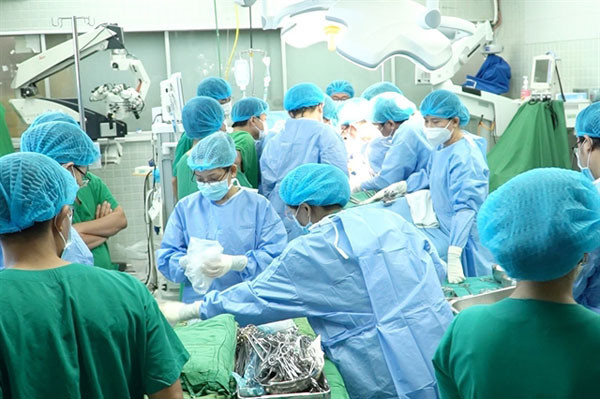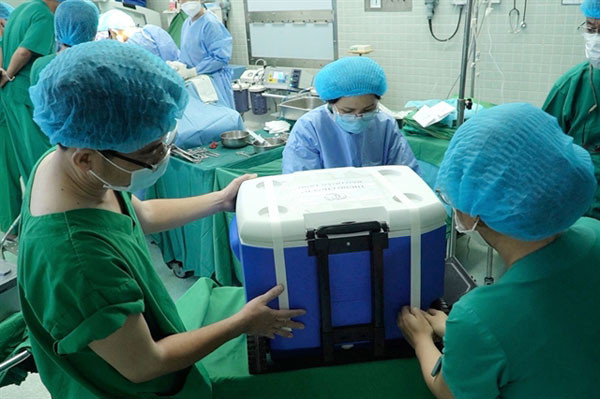
The number of human organ trafficking crimes has risen with increasingly sophisticated tricks and techniques, triggered by high demand and low rate of donation from dead brain donors, according to local authorities.
According to Senior Colonel Dinh Van Trinh, Deputy Head of Division 5, Criminal Police Department under the Ministry of Public Security, the criminals are organised with each individual in charge of different tasks in the procedures, including approaching, getting to know buyers and sellers, negotiating, faking the documents, in order to legalise their criminal acts in the name of humanitarian, not-for-profit purpose.
They approach people who want to buy body organs at hospitals or look for buyers and sellers via social network platforms, then set the prices and legalise their acts with fake documents in order to send the buyers/sellers to hospitals to have organs removed and transplanted, Trinh said at a conference on organ donation registration and the prevention of human organ and tissue trafficking held on Monday.
"Many brokers had been victims of this type of crime before and are aware of the high demand and profits. They collided and connected with other individuals to develop a ring," Trinh said at the event which was held by the Ministry of Health and Vietnam Health Economics Association.
"Benefits mostly go to brokers. They charge people in need of kidney VND800 million to 1 billion (US$33,800-42,200) a case but the seller gets VND200 million to 250 million only. Sellers do not want to reveal their identity, making it hard to identify brokers.”
According to Deputy Minister Tran Van Thuan after more than 15 years of implementation, many provisions of the Law on donation, removal and transplantation of human tissues and organs and the donation and recovery of cadavers have revealed shortcomings. Many are no longer consistent with practice, including regulations on registration of donations and the issue of prevention and combat of human tissue and organ trafficking.
He noted that the demand for tissue and organ transplants in Vietnam was huge with dozen of thousands of cases in need of kidney and/or liver transplants and thousands in need of transplantation of other organs and tissues.
"More than 90 per cent of donated organs transplanted in Vietnam are from living donors. There have been illegal acts involved in the trafficking and brokering of trafficking of organs and tissues, leaving serious social consequences. It is imperative to improve the legal frameworks and have solutions to prevent and combat the trafficking of organs and tissues in Vietnam," he said.
He suggested we offer both online and offline registration to make it more convenient for those who want to donate.

As part of the efforts to combat organ trafficking, he said, it was important to strengthen communication work to raise public awareness of the meaning of organ donation while having a mechanism to avoid direct contact between the donor and organ recipient to ensure transparency in an organ donation activity.
At the conference, many experts recommended amending the Law on donation, removal and transplantation of human tissues and organs and the donation and recovery of cadavers.
Amendments include adding the organ donor designation to driver licences or identity cards.
Nguyen Hoang Phuc, Deputy Director of the Vietnam National Coordinating Center for Human Organ Transplantation, said when people do identity card or apply for a driving licence, they will be asked whether to agree to become an organ donor.
This will help to increase the number of organ donors and help to limit the illegal trafficking of organs from living donors.

Tran Ngoc Sinh, vice Chair and General Secretary of the Vietnam Organ Transplant Association suggested Vietnam join the Declaration of Istanbul, which has been made in 2008 to address the urgent and growing problems posed by unethical activities involving organ trafficking and trafficking in persons for the purpose of organ removal.
The declaration has been endorsed by more than 135 national and international medical societies and governmental bodies involved in organ transplantation.
The Declaration clarifies the issues of transplant tourism, trafficking and commercialism and provides ethical guidelines for practice in organ donation and transplantation
“Endorsing the Declaration will help to ensure Vietnam complies with standards and does not tolerate tissue and organ trafficking,” Sinh said.
A total of 63,552 people have registered to be organ donors in Vietnam. As many as 7,297 transplants have been performed in Vietnam for eight types of organs, of which more than 6,000 were kidney transplants.
Source: Vietnam News